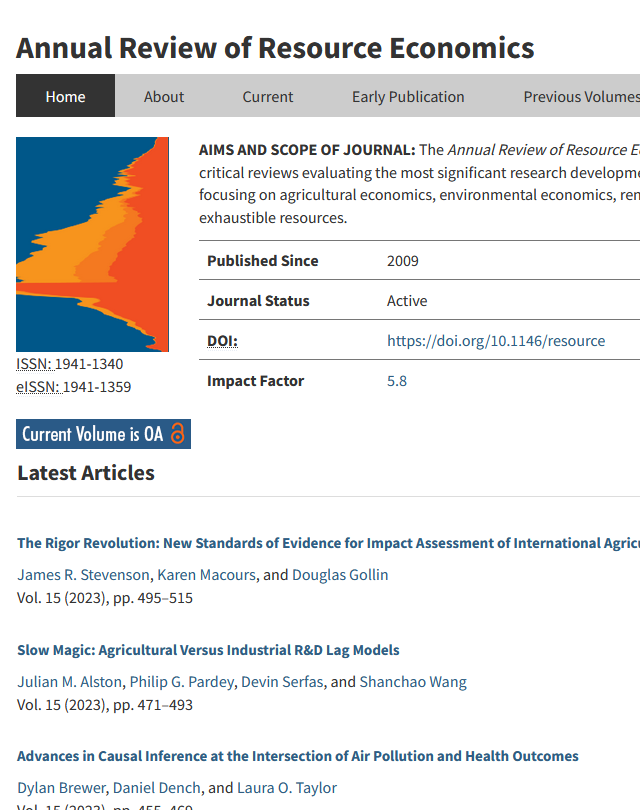未来,现在:对社会折扣的回顾
IF 8.4
2区 经济学
Q1 AGRICULTURAL ECONOMICS & POLICY
Annual Review of Resource Economics
Pub Date : 2022-07-14
DOI:10.1146/annurev-resource-111920-020721
引用次数: 19
摘要
世界各国政府正面临越来越大的压力,要求它们大举投资于期限长达数十年甚至数百年的项目。主要关切领域包括减缓气候变化、环境和生物多样性保护、核退役、加强基础设施和海岸防御以及长期保健管理。这些项目是否具有经济合理性取决于政府使用的社会贴现率(SDR)。这一变量将公共政策的未来成本和收益转换为其今天的价值,从而便于对不同期限的社会投资进行比较。至关重要的是,这种分析的结果对特别提款权选择的微小变化极为敏感,但各国和国际机构的政策指导方针差异很大。在本文中,我们对长期特别提款权的学术文献进行了回顾,特别强调了这些见解是如何融入政府指导的。《资源经济学年度评论》第14卷的最终在线出版日期预计为2022年10月。修订后的估计数请参阅http://www.annualreviews.org/page/journal/pubdates。本文章由计算机程序翻译,如有差异,请以英文原文为准。
The Future, Now: A Review of Social Discounting
Governments across the world are coming under increasing pressure to invest heavily in projects that have maturities of decades or even centuries. Key areas of concern include climate change mitigation, environmental and biodiversity protection, nuclear decommissioning, enhancing infrastructure and coastal defenses, and long-term health care management. Whether such projects are evaluated as being economically justifiable depends on the social discount rate (SDR) that the government deploys. This variable converts the future costs and benefits of public policy into their value today, thereby facilitating the comparison of social investments with different maturities. Critically, the result of such analysis is extremely sensitive to small changes in the choice of the SDR, yet policy guidelines differ widely across countries and international institutions. In this article, we provide a review of the academic literature on long-term SDRs, with particular emphasis on how these insights have been integrated into governmental guidance. Expected final online publication date for the Annual Review of Resource Economics, Volume 14 is October 2022. Please see http://www.annualreviews.org/page/journal/pubdates for revised estimates.
求助全文
通过发布文献求助,成功后即可免费获取论文全文。
去求助
来源期刊

Annual Review of Resource Economics
AGRICULTURAL ECONOMICS & POLICY-
CiteScore
9.40
自引率
0.00%
发文量
34
期刊介绍:
The Annual Review of Resource Economics provides authoritative critical reviews evaluating the most significant research developments in resource economics, focusing on agricultural economics, environmental economics, renewable resources, and exhaustible resources.
 求助内容:
求助内容: 应助结果提醒方式:
应助结果提醒方式:


